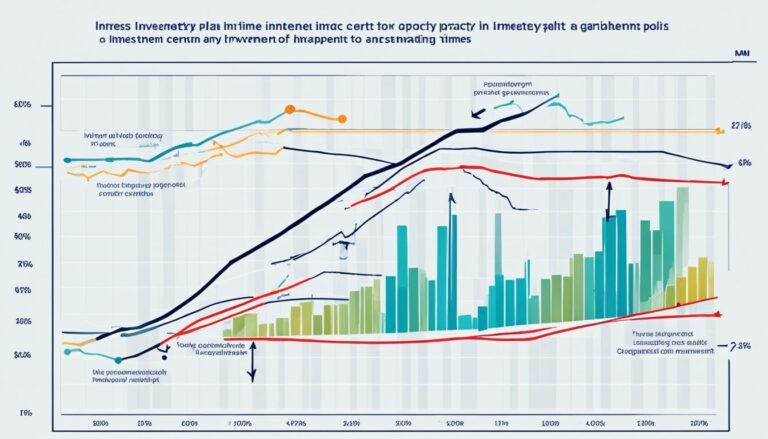Impact Investing & SRI: Aligning Values with Wealth
Did you know that impact investing has grown by over 60% in the last five years, reaching a staggering $715 billion in assets under management? This impressive figure highlights the increasing interest and importance of aligning financial decisions with social and environmental values.
Impact investing, also known as Socially Responsible Investing (SRI) or Ethical Investing, goes beyond traditional financial metrics to consider the broader impact of investments on society and the planet. It encompasses strategies such as ESG (Environmental, Social, and Governance) investing and Sustainable investing, offering investors the opportunity to make a positive difference while seeking competitive financial returns.
Key Takeaways:
- Impact investing has experienced significant growth in recent years, with over $715 billion in assets under management.
- It allows investors to align their financial decisions with their personal values and drive positive social and environmental change.
- Impact investing encompasses strategies such as SRI, ESG, and Sustainable investing.
- Investors can achieve competitive financial returns while making impactful investments.
- The future of impact investing looks promising, with technological advancements and increased awareness driving its evolution.
Understanding Values-Based Investing
Values-based investing is an investment approach that considers social, environmental, and corporate governance factors alongside financial gains. It involves making investment decisions based on both the potential financial returns and the alignment of companies with an investor’s values and ethical principles. By taking into account social and environmental factors, values-based investing aims to drive positive change while seeking sustainable financial growth.
In values-based investing, sustainability and ethical practices are key considerations. Investors analyze a company’s commitment to environmental stewardship, social responsibility, and transparency in governance before making investment decisions. This approach ensures that investments are directed towards companies that demonstrate strong ethical practices and strive for sustainability.
Understanding values-based investing requires knowledge of various strategies, including Socially Responsible Investing (SRI), Environmental, Social, and Governance (ESG) investing, and impact investing. While SRI involves screening out investments in certain industries or companies, ESG investing focuses on evaluating the environmental, social, and governance practices of potential investments. Impact investing aims to generate specific social or environmental effects through investments in organizations that align with an investor’s values.
By comprehending the key characteristics and differences among these strategies, investors can make informed decisions to align their investments with their values and contribute to positive societal and environmental outcomes.
Key Characteristics of Values-Based Investing Strategies
Values-based investing strategies share a common goal of integrating social and environmental factors with financial considerations. However, each strategy has its own distinct approach:
- Socially Responsible Investing (SRI): SRI involves screening out companies engaged in activities that conflict with an investor’s values. It focuses on investing in companies that promote positive social and environmental outcomes while seeking financial returns.
- Environmental, Social, and Governance (ESG) Investing: ESG investing evaluates a company’s environmental impact, social responsibility, and corporate governance practices. It considers factors such as carbon emissions, labor practices, board diversity, and executive compensation.
- Impact Investing: Impact investing aims to generate measurable social and environmental impacts alongside financial returns. It directs investments towards organizations and projects that address specific social or environmental challenges.
Gaining a deeper understanding of values-based investing empowers investors to align their investment decisions with their values while contributing to a more sustainable and ethical global economy.
Quote:
Values-based investing allows investors to make financial decisions that not only consider their own financial gains but also the impact they can have on social and environmental factors. It’s about investing with a purpose and contributing to a more sustainable and equitable future.
| Benefits of Values-Based Investing | Factors Considered |
|---|---|
| Alignment with values | Social and environmental factors |
| Positive impact on society and the environment | Sustainability and ethical practices |
| Risk management | Transparency in governance |
| Competitive financial returns | Financial gains |
Recent Trends in Ethical and Sustainable Investing
Values-based investing, particularly in ESG investment products, has experienced a remarkable surge in popularity over the past decade. In the first half of 2023, sustainable equity and fixed-income funds accounted for an impressive 7.9% of total global assets under management (AUM). This upward trajectory highlights the growing interest among investors in aligning their financial decisions with their ethical beliefs.
A key driver behind this shift is the increasing engagement of younger generations, such as Millennials and Gen-Xers, who prioritize investments that reflect their values. This demographic’s demand for values-based investing has led to the creation of a broader range of investment products that cater specifically to their sustainability and ethical criteria.
As Millennials and Gen-Xers continue to shape the investment landscape, the focus on sustainable equity and fixed-income funds is on an upward trajectory. These investment products allow individuals to support companies and initiatives that align with their values, fostering economic growth while addressing pressing social and environmental challenges.
To better illustrate the growth of values-based investing, consider the table below:
| Year | Sustainable Equity Funds AUM (in billions) | Fixed-Income Funds AUM (in billions) |
|---|---|---|
| 2018 | $500 | $200 |
| 2019 | $650 | $250 |
| 2020 | $800 | $300 |
| 2021 | $950 | $350 |
| 2022 | $1,100 | $400 |
| 2023 (H1) | $1,250 | $450 |
This data demonstrates a clear upward trend in the assets under management of sustainable equity and fixed-income funds, indicating the increasing prevalence of values-based investing.
“Values-based investing is not only about financial returns; it’s about investing with purpose and impact. Millennials and Gen-Xers are leading the charge by actively seeking investments that align with their values, driving the growth of sustainable and ethical investment products.”
As values-based investing gains momentum, it is rapidly transforming the financial industry, empowering investors to contribute to positive change while pursuing competitive financial returns.
Reasons to Consider Values-Based Investing
Values-based investing offers numerous advantages for investors seeking to align their financial decisions with their personal beliefs and contribute to positive change. Let’s explore the four key reasons why values-based investing is worth considering:
1. Alignment with Values
Values-based investing enables individuals to invest in companies and funds that reflect their principles and align with their personal values and beliefs. By selecting investments that uphold their ideals, investors have the opportunity to support organizations that are dedicated to making a positive impact on society and the environment.
2. Positive Change
Values-based investing allows investors to drive positive change by channeling their capital toward companies that prioritize sustainable and ethical practices. By investing in these organizations, individuals actively contribute to building a more socially and environmentally responsible business landscape, encouraging others to follow suit. The collective impact of these conscious investment choices can lead to significant societal transformation.
3. Risk Mitigation
Values-based investing can help mitigate unwanted risks by focusing on companies with responsible business practices. By considering environmental, social, and governance (ESG) factors alongside financial performance, investors gain insights into the long-term sustainability and resilience of potential investments. This integrated approach to risk management enhances the likelihood of avoiding companies with unsustainable practices, thereby reducing the possibility of financial losses.
4. Financial Returns
Contrary to the misconception that values-based investing sacrifices financial returns, extensive research indicates that aligning investments with ESG criteria can yield competitive financial performance. Companies that prioritize sustainability and ethical practices often demonstrate robust risk management, innovation, and long-term value creation. These factors contribute to potentially favorable financial returns for values-based investors.
Investing in alignment with personal values not only holds the potential for financial gains but also empowers individuals to contribute to positive change and address pressing global issues. Values-based investing provides a pathway for investors to make a meaningful impact while earning potential financial rewards.
Sustainable, Responsible, Impact (SRI) Investing Explained
Sustainable, Responsible, Impact (SRI) investing integrates environmental, social, and governance (ESG) criteria into the investment selection process. It aims to identify well-managed companies with demonstrated performance in areas such as environmental sustainability, social responsibility, and corporate governance. SRI strategies can include green investment strategies that seek out companies in sustainable industries, as well as ESG analysis to manage and reduce portfolio risk. By incorporating sustainability and ethical considerations, SRI investing allows investors to align their financial decisions with their values.
SRI investing is built on the foundation of sustainability, responsible practices, and impactful investments. It goes beyond traditional financial analysis by considering a company’s environmental impact, social initiatives, and governance practices. By integrating ESG factors into the investment process, SRI seeks to identify companies that are not only financially sound but also have a positive influence on society and the environment.
SRI strategies can take various forms, one of which is green investment strategies. These strategies focus on investing in companies that operate in sustainable industries such as renewable energy, clean technology, or environmentally friendly products. By supporting these industries, investors contribute to the growth of businesses that are actively working towards a greener future.
ESG analysis plays a critical role in SRI investing, as it helps investors manage and reduce portfolio risk. By evaluating a company’s environmental impact, social engagement, and governance practices, investors can gain insight into the long-term viability and sustainability of that company’s business model. This analysis allows investors to make informed decisions and allocate their capital to companies that align with their values.
Accountability and ethical practices are key tenets of SRI investing. Investors who prioritize SRI value companies that prioritize transparency, accountability, and ethical behavior. They seek out companies with strong corporate governance structures and a commitment to social and environmental responsibility. SRI investors hold companies accountable for their actions and expect them to act in the best interest of all stakeholders.
In summary, SRI investing empowers investors to align their financial decisions with their values and make a positive impact in the world. Through the integration of ESG criteria, green investment strategies, and a focus on accountability and ethical practices, SRI investing provides a framework for creating a more sustainable and responsible financial system.
Key Components of SRI Investing
| Component | Description |
|---|---|
| Environmental | Assessing a company’s impact on the environment, including resource consumption, pollution, and carbon emissions. |
| Social | Evaluating a company’s social initiatives, such as employee relations, diversity and inclusion, and community engagement. |
| Governance | Examining a company’s governance structure, board diversity, executive compensation, and ethical business practices. |
| Green Investment Strategies | Investing in companies operating in sustainable industries, such as renewable energy, clean technology, and eco-friendly products. |
| ESG Analysis | Assessing a company’s environmental, social, and governance practices to manage and reduce portfolio risk. |
| Accountability and Ethical Practices | Emphasizing transparency, accountability, and ethical behavior in companies’ operations and decision-making processes. |
Benefits of SRI Investing
SRI investing offers several benefits for investors who seek both financial returns and alignment with their values. By integrating Environmental, Social, and Governance (ESG) criteria into their investment strategies, individuals can make a positive impact on society and the environment while potentially enhancing their portfolio’s performance.
Alignment with Values: One of the key advantages of SRI investing is the ability to align investments with personal values. By supporting companies and funds that reflect their principles and excluding those that contradict their ethics, investors gain a sense of purpose and satisfaction.
Risk Management: Incorporating ESG criteria into investment decision-making can help identify risks that traditional financial analysis may overlook. By considering social and environmental factors, SRI investors can build more resilient portfolios that mitigate potential risks associated with unsustainable or unethical practices.
Financial Performance: Contrary to the misconception that ethical investments yield lower returns, studies have shown that SRI funds can perform on par with or even outperform conventional funds. By investing in companies that prioritize sustainable practices, strong corporate governance, and positive social impact, investors can potentially achieve competitive financial returns.
Market Influence: SRI investing can also influence companies and markets towards more sustainable and ethical practices. As more investors allocate capital to socially responsible investments, companies are incentivized to adopt sustainable strategies, accountable governance, and greater transparency. This shift in corporate behavior can promote positive social and environmental outcomes for society as a whole.
In summary, SRI investing offers multiple benefits, including the alignment of investments with personal values, risk management through ESG considerations, potential financial performance on par with conventional investments, and the ability to influence companies and markets towards sustainable practices. By choosing SRI, investors can make a positive impact while striving for their financial goals.
Challenges and Criticisms of SRI Investing
Socially Responsible Investing (SRI) has faced various challenges and criticisms that affect its widespread adoption and effectiveness. Understanding these obstacles is crucial in navigating the complexities of SRI.
Defining “Responsible”
One of the main challenges of SRI is the absence of a universal definition of what constitutes a socially responsible investment. Different investors and organizations may have divergent interpretations of responsible investing, making it difficult to assess and compare SRI funds. This lack of consensus hampers transparency and creates confusion among investors.
Data and Transparency
Obtaining reliable and standardized Environmental, Social, and Governance (ESG) data is another challenge that impacts SRI investing. The availability and quality of data can vary across companies, sectors, and regions, making it challenging for investors to make fully informed decisions. Without accurate and consistent ESG data, it becomes difficult to evaluate the sustainability and ethical performance of potential investments.
Furthermore, the transparency of companies and funds regarding their ESG practices and impact can vary widely. Incomplete or insufficient disclosure can limit the ability of investors to assess the true sustainability of their investments.
Impact Measurement
Measuring the real-world impact of SRI investments poses a complex challenge. While SRI aims to drive positive change, quantifying and evaluating the actual social and environmental outcomes can be intricate. This complexity raises questions about the effectiveness of SRI strategies in creating meaningful and lasting change.
Greenwashing
Greenwashing is a practice that compromises the integrity of SRI investing. Some companies or funds may engage in greenwashing, falsely presenting themselves as environmentally or socially responsible to attract investors. This misleading communication can misrepresent their actual sustainability practices and impact, ultimately deceiving investors who seek genuine SRI options.
The Impact of SRI Investing
SRI investing has made a significant impact on both the investment world and society. By prioritizing corporate behavior and encouraging sustainable practices, SRI has spurred companies to adopt more environmentally responsible approaches, embrace social justice initiatives, and enhance their corporate governance.
This image illustrates the positive impact of SRI on corporate behavior and sustainable practices, as socially conscious investors actively support companies with sustainable practices.
Driving Change and Accountability
SRI investing has not only influenced individual companies but has also contributed to systemic changes. By channeling capital towards sustainable and socially responsible companies, SRI investors have fostered a shift in market dynamics and incentivized businesses to prioritize environmental sustainability, ethical practices, and social impact alongside profitability.
Companies are increasingly recognizing the importance of addressing environmental and social concerns due to growing consumer demands, regulatory pressures, and investor preferences for socially responsible investments. As a result, many organizations have implemented initiatives and programs to improve their sustainability, diversity and inclusion practices, and overall ethical conduct.
“SRI investors play a crucial role in holding companies accountable for their actions and driving the adoption of sustainable practices across industries.” – Jane Thompson, Sustainability Analyst
Expanding Financial Products for Socially Conscious Investors
The rise of SRI has fueled the development of new financial products and services to meet the demand of socially conscious investors. These products include specialized impact investment funds, green bonds, and sustainability-themed exchange-traded funds (ETFs), among others. Such offerings allow investors to allocate their capital towards companies and projects that align with their values and focus on sustainable and socially impactful outcomes.
Financial institutions and asset managers have also integrated sustainability considerations into their product offerings, providing investors with a broader range of choices. This greater variety of investment options promotes the growth of SRI and empowers socially conscious investors to make investments that drive positive change.
Contributing to Positive Social and Environmental Outcomes
Through their investment decisions, SRI investors actively support companies that prioritize sustainable practices, social justice, and responsible corporate behavior. By allocating capital to these companies, SRI investors contribute to positive social and environmental outcomes, such as reducing carbon emissions, promoting diversity, supporting fair labor practices, and fostering community development.
Furthermore, the influence of SRI investors extends beyond the companies in which they invest. As companies witness the benefits and value of sustainable practices and responsible behaviors, they are more likely to adopt similar principles and strive for positive change. The impact of SRI investing, therefore, transcends individual investments and contributes to creating a more sustainable and socially responsible society as a whole.
The Future of SRI Investing
The future of Socially Responsible Investing (SRI) is poised for exciting advancements, driven by technological innovations, improved data collection, and regulatory developments. These factors are expected to enhance the effectiveness and accessibility of SRI, making it an increasingly popular investment approach for individuals and institutions alike.
Technological Advancements
Technological advancements play a vital role in shaping the future of SRI. The emergence of advanced analytics, artificial intelligence, and machine learning algorithms enables investors to analyze vast amounts of data efficiently, identifying companies that align with their values. These technological tools enhance the ability to screen investments based on social and environmental indicators, facilitating informed decision-making.
Data Collection
Accurate and comprehensive data collection is essential for the success of SRI. As companies continue to face growing pressure to disclose their environmental, social, and governance (ESG) performance, investors gain access to more reliable and standardized data. This increased transparency enables investors to evaluate and compare companies’ sustainability practices, fostering informed decisions and supporting the growth of SRI.
Regulatory Developments
Regulatory developments are instrumental in shaping the future of SRI. Governments and regulatory bodies worldwide are recognizing the importance of sustainable investing and are implementing policies to promote transparency and accountability. Increased disclosure requirements around ESG factors provide investors with critical information, empowering them to align their investments with their values and make informed decisions.
Informed Decisions
With the advancement of technology, improved data availability, and supportive regulations, investors are better equipped to make informed decisions within the realm of SRI. By considering environmental, social, and governance factors alongside financial metrics, investors can assess the long-term sustainability and ethical practices of companies. This integration of broad-based information enables SRI investors to drive positive change while pursuing their financial goals.
As awareness of global challenges continues to rise, the interest in SRI is expected to grow further. SRI investing will become a crucial tool in addressing pressing issues such as climate change, social inequality, and corporate responsibility. The future of SRI holds tremendous potential for creating a more sustainable and equitable world.
Conclusion
Socially Responsible Investing (SRI) is a powerful tool that allows investors to align their financial decisions with their values, contributing to a more sustainable and equitable global economy. By integrating ethical, social, and environmental considerations into their investment strategies, investors have the power to drive positive change while still seeking competitive financial returns.
Although challenges such as data availability and impact measurement exist, the future of SRI looks promising. Growing innovation and increasing investor interest are propelling the evolution of this dynamic field. As SRI becomes more mainstream, it has the potential to play a crucial role in addressing global challenges and promoting a more sustainable and just world.
SRI is not just a trend; it represents a fundamental shift in the way we approach investing. By actively considering the social and environmental impact of our investment choices, we can contribute to a global economy that prioritizes sustainability and equity. As more investors embrace SRI and demand for responsible and impactful investments continues to grow, we can collectively shape a future that benefits both our financial well-being and the well-being of our planet and society.








